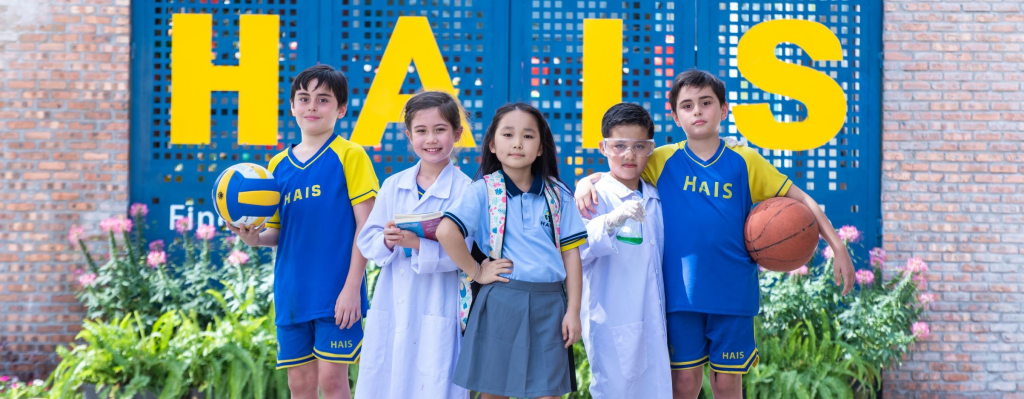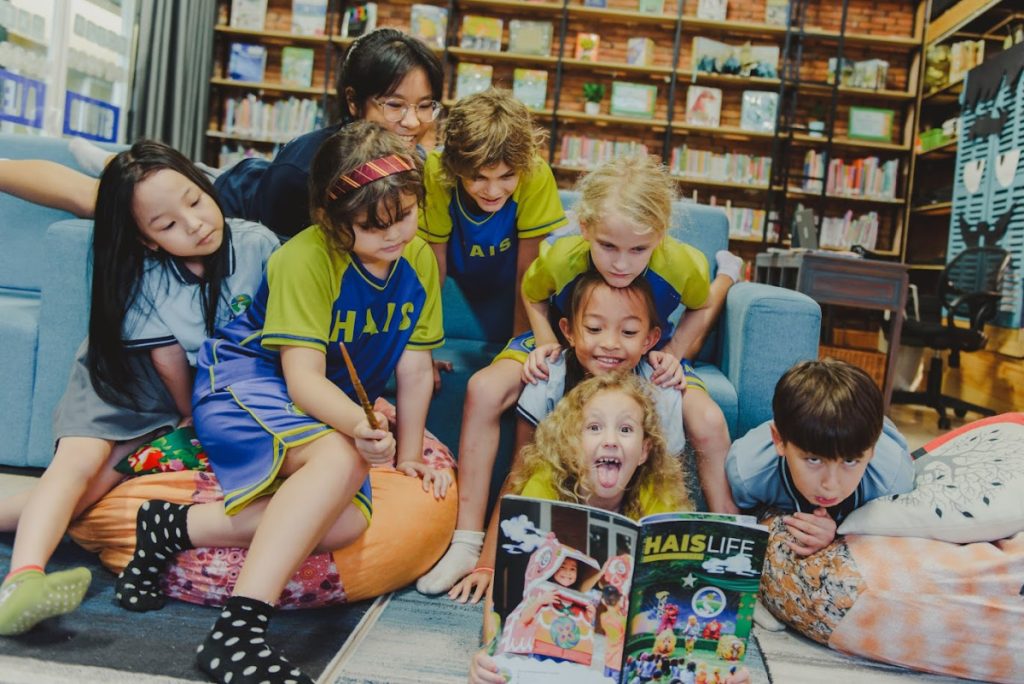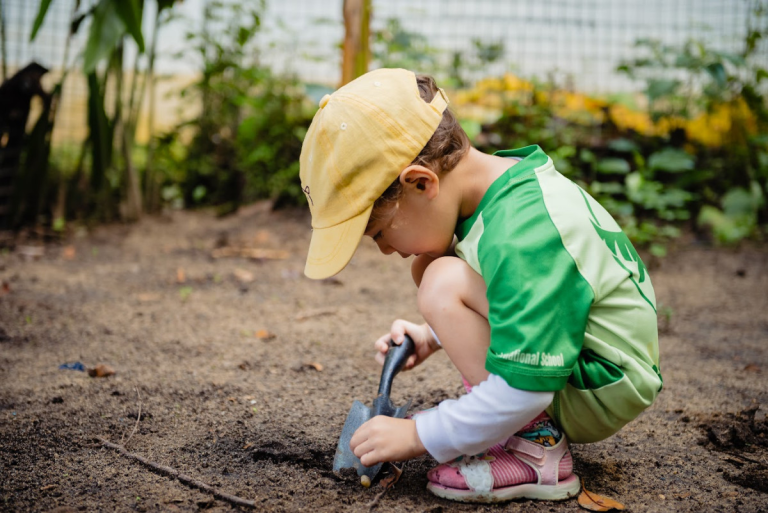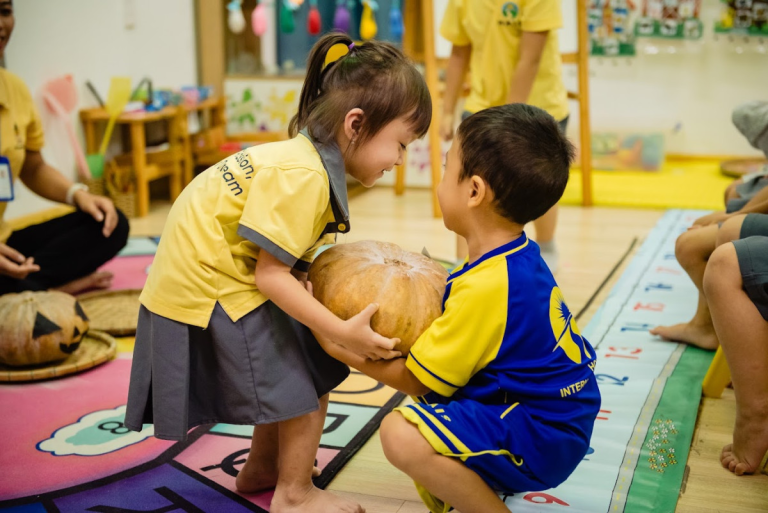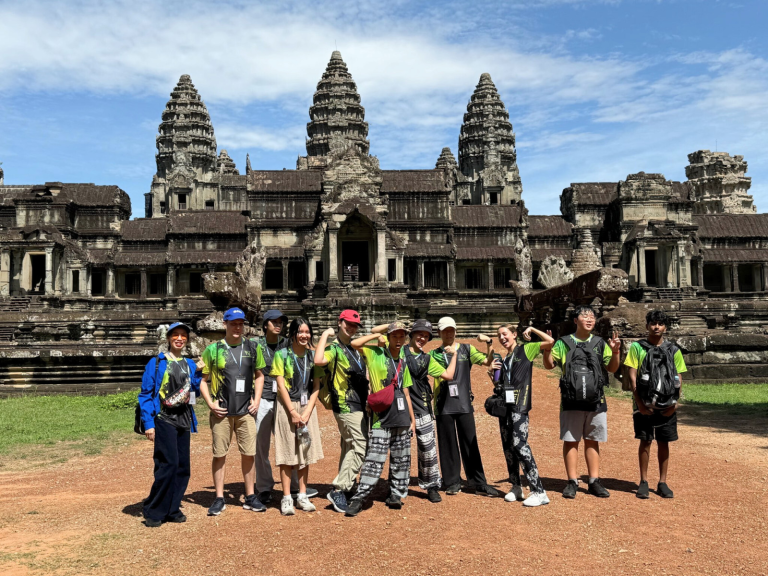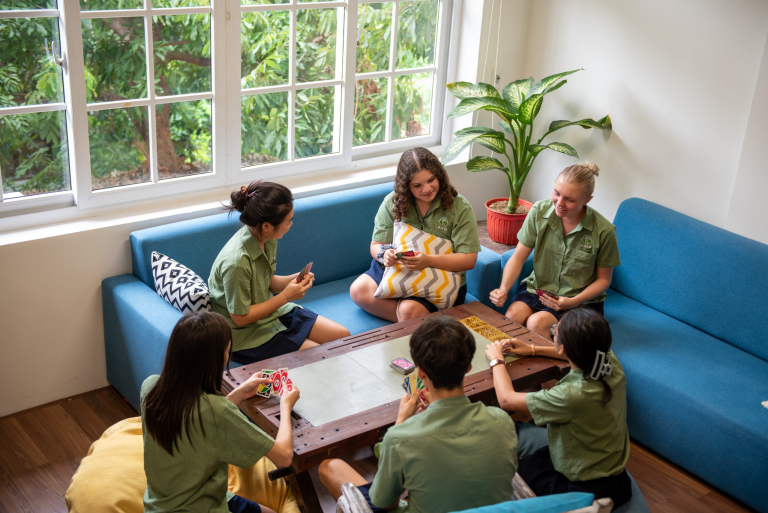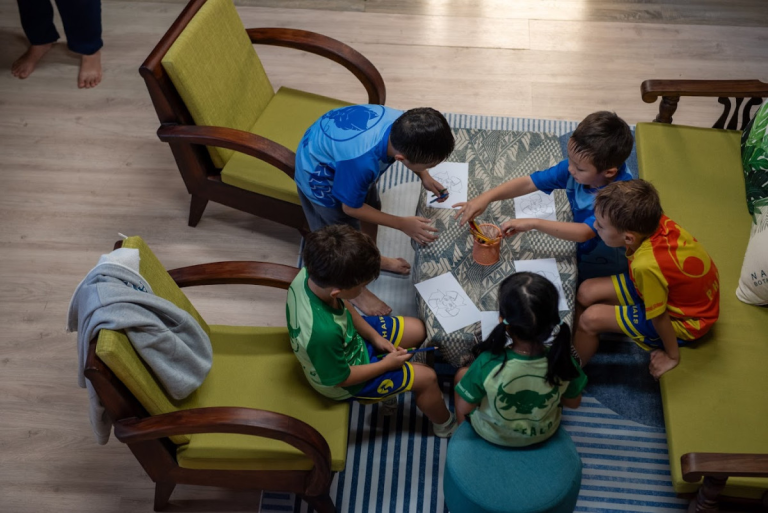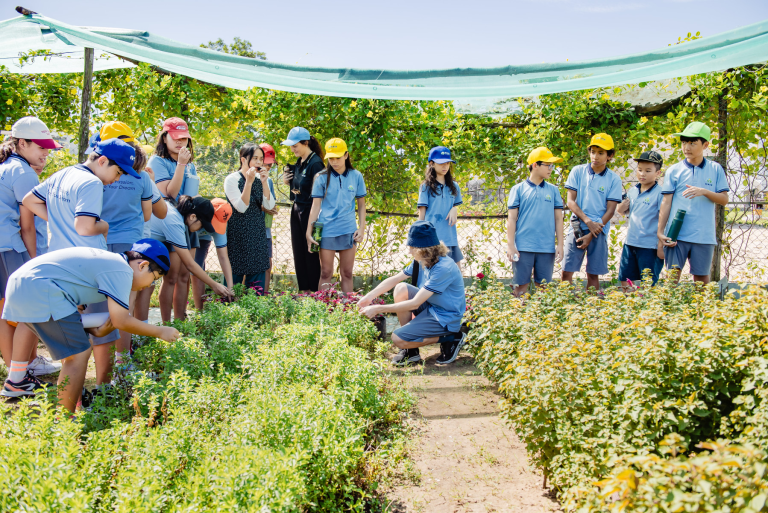International Primary
An International Education
From the Early Years Foundation Stage, children can transfer, on completion of a successful admissions interview, to Years 1 and 2 of the Primary School, where they begin a more formalised approach to learning. The HAIS curriculum is broad and diverse and, whilst it is subject-based, there are many opportunities for a cross-curricular approach to learning. Much of the timetable is classroom-based, with each class having a teaching support assistant.
In this very important phase of their education, children apply the skills they have learned in the Foundation Stage and begin to develop new approaches to learning. As children progress through Years 1 and 2, we encourage them to become increasingly independent as learners by helping them to:
- Be resilient – show determination and initiative.
- Be resourceful – self-select resources that help with their learning.
- Be reflective – thinking about the next step in their learning and how to do better next time.
The curriculum for Years 3 to 6 is designed to ensure children gain learning experiences that develop mastery of linguistic, mathematical, scientific, technological, social, physical, aesthetic and creative skills and abilities. The class teachers are responsible for the delivery of the Cambridge International Primary Curriculum subjects and the pastoral care of our students. The Cambridge International Primary Curriculum at HAIS develops the skills, knowledge and understanding to prepare learners for a smooth transition to Cambridge Lower Secondary.
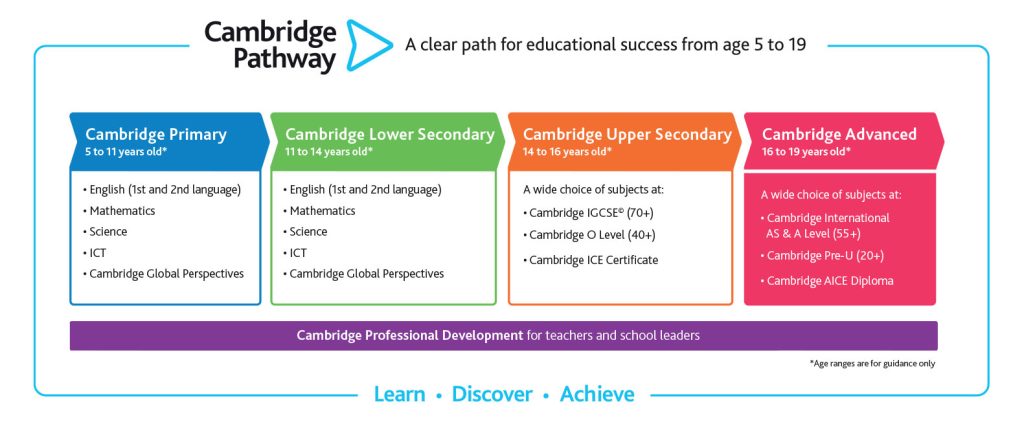
Core Subjects
English Language
STAGES 1 & 2
By the beginning of Year 2, pupils should be able to read all common graphemes (letters and letter combinations used to represent sounds). They should be able to read unfamiliar words containing these graphemes accurately and without undue hesitation by sounding them out in books that are matched closely to each pupil’s level of word reading knowledge. They should also be able to read many common words taught so far (for example, shout, hand, stop, or dream) without needing to blend the sounds out loud first. Pupils’ reading of common exception words (for example, you, could, many, or people) should be secure. Pupils will increase their fluency by being able to read these words easily and automatically. Finally, pupils are able to retell some familiar stories that have been read to and discussed with them or that they have acted out during Year 1.
During Year 2, teachers continue to focus on establishing pupils’ accurate and speedy word reading skills. They make sure that pupils listen to and discuss a wide range of stories, poems, plays, and information books. The sooner pupils read well and do so frequently, the sooner they are able to increase their vocabulary, comprehension and knowledge across the wider curriculum.
In writing, pupils in Year 2 should be able to compose individual sentences orally and then write them down. They should be able to spell correctly many of the words covered in Year 1. They should also be able to make phonetically plausible attempts to spell words they have not yet learnt. Finally, they are taught to form individual letters correctly, establishing good handwriting habits from the beginning.
STAGES 3-6
By the beginning of Year 3, students should be able to read books written at an age-appropriate interest level. They should be able to read them accurately and at a speed that is sufficient for them to focus on understanding what they read rather than on decoding individual words. They should be able to decode most new words outside their spoken vocabulary, making a good approximation to the word’s pronunciation. As their decoding skills become increasingly secure, teaching is directed more towards developing their vocabulary and the breadth and depth of their reading, making sure that they become independent, fluent, and enthusiastic readers who read widely and frequently.
By the beginning of Year 5, students should be able to read aloud a more comprehensive range of poetry and books written at an age-appropriate interest level with accuracy and a reasonable speaking pace. They should be able to read most words effortlessly and work out how to pronounce unfamiliar written words with increasing automaticity.
They should be reading widely and frequently, outside as well as in school, for pleasure and information. They should be able to read silently, with good understanding, inferring the meanings of unfamiliar words, and then discuss what they have read.
By the end of Year 6, students’ reading and writing should be sufficiently fluent and effortless for them to manage the general demands of the curriculum in Year 7 across all subjects, and there will continue to be a need for students to learn subject-specific vocabulary.
Specific requirements for students to discuss what they are learning and to develop their wider skills in spoken language form part of the HAIS English curriculum. In Years 5 and 6, students’ confidence, enjoyment and mastery of language are extended through public speaking, performance, and debate.
Mathematics
STAGES 1 & 2
The principal focus of mathematics teaching in Years 1 and 2 at HAIS is to ensure that pupils develop confidence and mental fluency with whole numbers, counting, and place value. This involves working with numerals, words, and the four operations, including using practical resources (for example, concrete objects and measuring tools). At this stage, pupils develop their ability to recognise, describe, draw, compare and sort different shapes and use the related vocabulary. Teaching also involves using a range of measures to describe and compare different quantities, such as length, mass, capacity/volume, time and money.
By the end of Year 2, pupils should know the number bonds to 20 and be precise in using and understanding place value. An emphasis on practice at this early stage will aid fluency.
Pupils read and spell mathematical vocabulary at a level consistent with their increasing word reading and spelling knowledge in Years 1 and 2.
STAGES 3-6
The principal focus of mathematics teaching in the upper primary school at HAIS is to ensure that students extend their understanding of the number system and place value to include larger integers. This will develop the connections that students make between multiplication and division with fractions, decimals, percentages, and ratios.
At this stage, students develop their ability to solve a wide range of problems, including increasingly complex properties of numbers and arithmetic and problems demanding efficient written and mental calculation methods.
By the end of Year 4, students should have memorised their multiplication tables up to and including the 12 multiplication tables and show precision and fluency in their work.
In Year 5, with this foundation in arithmetic, students are introduced to the language of algebra as a means for solving a variety of problems. Teaching geometry and measurement consolidates and extends knowledge developed in numbers. Students classify shapes with increasingly complex geometric properties and they learn the vocabulary needed to describe them.
By the end of Year 6, students are fluent in written methods for all four operations, including long multiplication and division and secure in working with fractions, decimals, and percentages.
Students can read, spell and pronounce mathematical vocabulary correctly.
Science
STAGES 1 & 2
The principal focus of science teaching in Years 1 and 2 at HAIS is to enable pupils to experience and observe phenomena, looking more closely at the natural and humanly constructed world around them. They are encouraged to be curious and ask questions about what they notice. They are supported to develop their understanding of scientific ideas by using different types of scientific enquiry to answer their own questions, including observing changes over a period of time, noticing patterns, grouping and classifying things, carrying out simple comparative tests, and finding things out using secondary sources of information. They begin to use simple scientific language to talk about what they have found out and communicate their ideas to a range of audiences in various ways. Most of the learning about science is done through the use of first-hand practical experiences. There is also some use of appropriate secondary sources, such as books, photographs, and videos.
Pupils read and spell scientific vocabulary at a level consistent with their increasing word reading and spelling knowledge in Years 1 and 2.
STAGES 3-6
The principal focus of science teaching in the upper primary school at HAIS is to enable students to develop a deeper understanding of a wide range of scientific ideas. They will do this by systematically exploring and talking about their ideas, asking their own questions about scientific phenomena, and analysing functions, relationships, and interactions. They will encounter more abstract ideas and begin to recognise how these ideas help them to understand and predict how the world operates. They will also begin to recognise that scientific ideas change and develop over time. They will select the most appropriate ways to answer science questions using different types of scientific enquiry, including observing changes over different periods of time, noticing patterns, grouping and classifying things, carrying out comparative and fair tests, and finding things out using a wide range of secondary sources of information. Students will be able to draw conclusions based on their data and observations, use evidence to justify their ideas, and use their scientific knowledge and understanding to explain their findings.
Students should read, spell, pronounce and use scientific vocabulary correctly.
Non-Core Subjects
Digital Literacy
The Cambridge Primary Digital Literacy curriculum enables learners to become accomplished users of digital tools and to understand the digital world that they are growing up in. Learners will develop the skills to create digital artefacts with increasing proficiency and sophistication. They will become equipped to join the digital world and will be increasingly able to make important decisions about their own safety and wellbeing.
S.T.E.M.
STAGES 1 & 2
Children learn how to think imaginatively and talk about what they like and dislike when designing and making. They build on their early childhood experiences by investigating objects around them. They explore how familiar things work and talk about, draw and model their ideas and engage in long-term projects using a range of materials including digital resources. They learn how to design and make safely and how to start using STEM as part of their designing and making.
STAGES 3 -6
Children work on their own and as part of a team on a range of designing and making activities and long-term projects. They think about what products are used for and the needs of the people who use them. Students plan what must be done and identify what works well and what could be improved in their own and other people’s designs. They draw on knowledge and understanding from other areas of the curriculum and use digital resources in a range of ways.
Drama
Drama is both a creative subject and also improves communication, promotes literacy, improves story recall, and generally assists with public speaking (a skill required in all manner of jobs later in life).
Led by Ms Jennifer, who has a Master of Arts in Education (majoring in Drama Education and Theatre Arts), the Drama programme is the only one of its kind offered at international schools in Da Nang and Hoi An. Ms Jennifer has spearheaded, produced, and directed productions at Universities, International Schools and Festivals for over 15 years and is an incredibly motivating educator.
Students will learn:
- Communication skills (voice and tone, facial expressions, body language, speech enunciation and pronunciation);
- Public speaking skills;
- Creative thinking and problem solving through scenery building, prop creation, costume design, and improvisation;
- Confidence such as delivering lines on stage, handling unexpected situations promptly and effectively;
- Commitment. Putting together a show can take weeks, and it’s important for everyone involved to follow the production through from beginning to end. Even short practices in drama class require the performers to stay on task throughout the scene; and
- Cooperation and collaboration. Drama class is very much a group effort. You’re not putting on the production alone. Rather, you must work closely with everyone in the performance including the other actors, directors, musicians, and backstage crew.
Physical Education
Physical Education is a vital part of a balanced school curriculum. Regular exercise improves physical and mental health and there is growing evidence that it improves academic performance across the curriculum. Establishing good patterns of exercise in school provides learners with the foundation of an active and healthy lifestyle.
What will students learn?
- Increase confidence and move with increasing control, fluency and variety;
- Improve understanding of concepts, rules, tactics, strategies and compositional ideas;
- Participate in respectful and responsible ways, engaging appropriately and safely;
- Improve knowledge and understanding of how physical education can contribute to a healthy and active lifestyle;
- Develop transferable skills promoting physical, cognitive and social development; and
- Become independent, critical and reflective movers and thinkers.
Art and Design
Art and Design gives learners a platform to express themselves, sparking imagination, creativity and developing transferable skills. Students explore and push boundaries to become reflective, critical and decisive thinkers. They learn how to articulate personal responses to their experiences.
What will students learn?
- Learn will see themselves as artists and become increasingly reflective and independent;
- Develop the skills needed to express ideas creatively and to communicate visually; and
- Understand their place and the place of others in a creative, innovative and interconnected world.
Music
Music fosters creativity and builds confidence. It helps learners express themselves and shows them the importance of communication as they learn to connect with other musicians and audiences.
Learners explore music as performers, composers and informed listeners. They make, understand and appreciate music from different cultures, times and places, helping them develop leadership and collaboration skills and self-confidence.
What will students learn?
- Cultivate a joy of music through participating in meaningful and enjoyable experiences;
- Develop the knowledge, skills and attitudes necessary to contribute as musicians;
- Collaborate with others in purposeful and expressive ways through singing and playing instruments;
- Nurture their individual and collective creativity; and
- Use their growing knowledge to explore and generate unique, relevant and valuable music.
World Languages
- English as an Additional Language
- Vietnamese as an Additional Language
- French as an Additional Language
Global Perspectives
STAGES 1-6
Global Perspectives is a unique, transformational programme that helps primary learners to develop transferable skills such as critical thinking and problem-solving. It offers valuable opportunities to reinforce links and skills learnt in other subjects across the Cambridge Primary programme.
The emphasis is on developing learners’ ability to think critically about a range of global issues where there is always more than one point of view. Learners study global topics relevant to them – for example, the environment, education and keeping healthy.
The key benefits and aims of the programme provide a comprehensive set of learning objectives detailing what learners should be able to do by the end of each stage. Learning objectives are divided into six main areas called ‘strands’, which run through every stage. Each strand corresponds to one of the following skills:
- Research
- Analysis
- Evaluation
- Reflection
- Collaboration
- Communication
The skills are taught through a wide range of topics using a personal, local and global perspective.
Global Perspectives is taught through a series of Challenges. Each Challenge encourages learners to become independent, active and lifelong learners. They include activities that follow a dynamic learning approach to support the development of a particular skill. They also include guidance on how to encourage learners to consider and connect personal, local and global perspectives.
D.E.A.R
Study pathway
